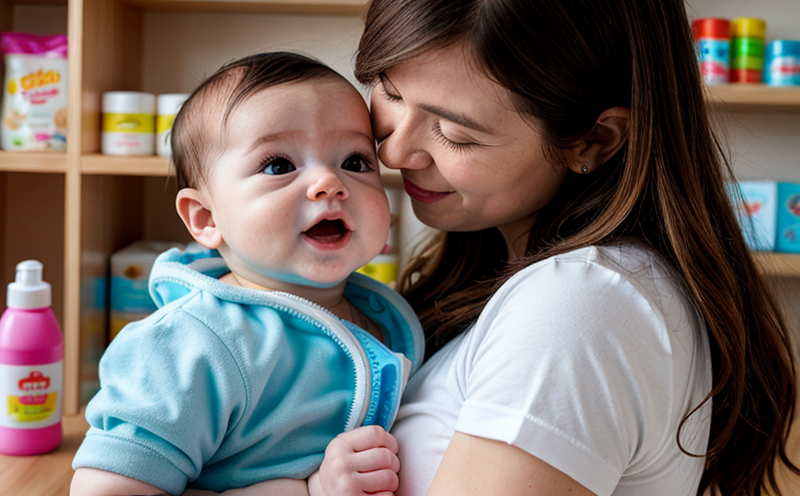Regulatory Compliance Testing of Baby Products (CPSIA)
The Consumer Product Safety Improvement Act of 2008 (CPSIA) is a United States federal law designed to ensure the safety and health of consumer products, including baby products. This legislation requires manufacturers to undergo stringent testing to comply with various regulations aimed at preventing injuries or deaths caused by unsafe products.
Compliance with CPSIA standards ensures that companies meet legal requirements and protect consumers from harmful substances such as lead, phthalates, small parts, and other potential hazards. For baby products specifically, compliance can significantly enhance brand reputation and customer trust, which are crucial for maintaining market share in the highly competitive consumer goods industry.
Our laboratory specializes in providing regulatory compliance testing services tailored to CPSIA standards. We employ state-of-the-art equipment and methodologies to ensure accurate and reliable test results that meet or exceed all relevant regulations. From initial consultation to final report, we offer a comprehensive service designed to help businesses navigate the complexities of CPSIA requirements.
Our team of experts is well-versed in interpreting CPSIA guidelines and can provide guidance on how best to implement compliance strategies within your organization. By working closely with you, we aim to minimize disruptions to production schedules while ensuring full adherence to all necessary regulations.
In addition to general testing services, our laboratory also offers customized solutions for specific product types under CPSIA oversight. Whether it's a new line of baby toys or changes to existing formulations, our experienced staff can assist in developing effective compliance plans that align with current legal standards.
- Lead content analysis
- Phthalates detection
- Small parts testing
- Flammability evaluation
- Mechanical strength assessment
- Safety label verification
- Packaging material examination
By partnering with us, you gain access to an experienced team committed to helping your business succeed in today’s stringent regulatory environment. Let our expertise assist you in meeting CPSIA requirements and maintaining compliance throughout the lifecycle of each product.
Why It Matters
The importance of regulatory compliance cannot be overstated when it comes to baby products. Given the vulnerability of infants, even minor deviations from safety standards can have severe consequences. Meeting CPSIA requirements not only protects public health but also strengthens brand integrity and fosters consumer confidence.
Non-compliance can lead to significant penalties, including fines, recalls, and reputational damage. In extreme cases, it may result in legal action against manufacturers or importers. Therefore, investing in thorough testing and ensuring full adherence to CPSIA standards is essential for any company involved in the production of baby products.
Moreover, compliance helps build trust between businesses and consumers by demonstrating a commitment to quality and safety. This trust can translate into increased sales and loyalty among parents who seek assurance that their children's belongings are free from harmful materials or design flaws.
In summary, CPSIA compliance is not merely a legal requirement; it represents a fundamental responsibility towards protecting the well-being of consumers, particularly those most vulnerable to risks associated with unsafe products. By prioritizing this aspect of your operations, you contribute positively to both business sustainability and societal welfare.
Why Choose This Test
Selecting the right testing service provider is critical for ensuring accurate results that accurately reflect the safety characteristics of baby products. Here are several reasons why choosing our laboratory could be beneficial:
- Expertise and Experience: Our team comprises highly skilled professionals who possess deep knowledge about CPSIA regulations and best practices.
- State-of-the-Art Equipment: We utilize cutting-edge technology to perform precise measurements and analyses, guaranteeing high-quality outcomes.
- Comprehensive Coverage: From raw materials to finished goods, we cover the entire supply chain, ensuring no step is overlooked.
- Custom Solutions: Whether you need assistance with a one-time project or ongoing support, our flexible approach allows us to tailor services specifically for your needs.
- Rapid Turnaround Times: We understand that timely delivery of results is vital. Our efficient processes enable quick turnaround times without compromising on accuracy.
- Confidentiality Assurance: Protecting proprietary information is paramount, and we adhere strictly to confidentiality agreements.
By partnering with our laboratory, you can rest assured that your baby products will undergo rigorous evaluation according to the highest industry standards. This ensures not only compliance but also peace of mind for all stakeholders involved in this process.
Environmental and Sustainability Contributions
Baby product testing goes beyond mere safety; it plays a crucial role in promoting environmental sustainability as well. By adhering to CPSIA regulations, manufacturers contribute positively towards reducing waste generation and minimizing harmful impacts on the environment.
- Reduced Waste: Ensuring that baby products are free from hazardous substances like lead or phthalates reduces the likelihood of improper disposal leading to environmental contamination.
- Eco-friendly Materials: Encouraging sustainable practices during product development leads to the use of more environmentally friendly materials, which ultimately decrease carbon footprints throughout manufacturing processes.
- Recyclability: Promoting the design of products that can be easily recycled helps in creating a circular economy, thereby reducing reliance on virgin resources and promoting resource conservation.
Incorporating these practices into CPSIA compliance efforts supports broader sustainability goals across industries. As more companies adopt similar approaches, collective impacts become substantial, fostering healthier ecosystems for future generations.





